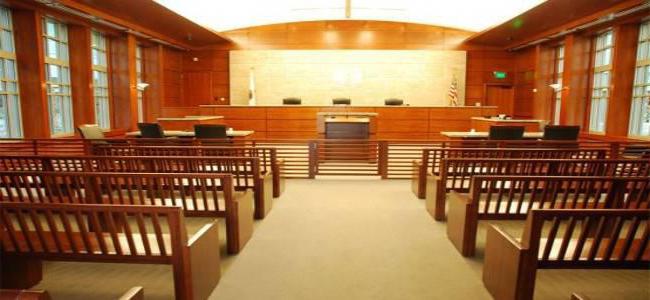Legal proceedings are a very broad and complex state system, and therefore it is not so easy to understand it. This article will examine in detail the most important element of the judicial system - the special procedure for entry of sentences into legal force.
Courts of first instance
The judicial system has a two-stage structure. In the courts of first instance, the first version of the sentence enters into force. It can be appealed to a body of second instance, which is of cassation or appeal character. During the appeal period, the decision of the first court shall enter into legal force.
According to the law, participants in criminal proceedings have the opportunity to appeal the sentence within 10 days from the date of its adoption. The same rule applies to prisoners - they have the right to file a complaint from the moment they are presented with a copy of the sentence.
In which courts of first instance can the entry into force of a sentence be implemented? The Magistrate's Court is the very first instance in the entire state system. However, this body is not authorized to impose heavy sentences on the accused. A district court deals with this, which acts as an instance of both the first and second types.
Appeals
The first court of appeal is the district court. This body makes acquittals or convictions, and also considers cases submitted by a justice of the peace. The district court has been appealing cases as a second instance for ten days.
What is characteristic of the appeal process? The courts in this case consider cases that have not yet entered into legal force. For example, a justice of the peace could pronounce a sentence, which will take effect only after a few days. The case is referred to the second instance, which either confirms the corpus delicti or refutes it.
Why is appeal proceedings necessary? Firstly, to provide an additional guarantee of justice. Secondly, to protect against unlawful and unjustified conviction of the defendant. Finally, the appeal helps to correct the mistakes that the first instance could have made.
Cassation instances
The main difference between cassation proceedings and appeal is the entry into force of a sentence. The determination of the court of cassation type shall enter into force at the time of its proclamation. A review can only take place if any new circumstances of the case are revealed. The determination itself must be sent for execution within a week.
If a convicted citizen is to be released from custody, the sentence shall be executed immediately. In other cases, a copy of the decision should be sent to the administration of the place of restriction of freedom.
According to article 392 of the Code of Criminal Procedure, a verdict or decision that has entered into legal force is mandatory for all state bodies, local authorities, public associations and officials. Non-execution of the sentence entails liability under article 315 of the Criminal Code of the Russian Federation.
On the competence of the court in the execution stage
Which courts can consider issues related to the implementation of the sentence? Article 396 of the Code of Criminal Procedure indicates the following authorities:
- a court that previously ensured the entry into force of a sentence;
- court at the place of serving the sentence;
- court at the place of residence of the convicted person;
- court at the place of detention of the convicted citizen;
- court, the competence of which includes the case of the convict.
It is also necessary to take into account the qualification of the crime under the Criminal Code of the Russian Federation and the place of last residence of the guilty citizen.
The competence of all represented courts includes deferment of execution of a sentence - due to illness, pregnancy, serious consequences for the convicted person, voluntary desire to imprisonment, etc. Deferral is included in the group of dispositive court decisions, that is, it is a right, not an obligation. The remaining powers of the court will be described below.
The powers of the courts
The implementation of the work on the entry into force of a court conviction is far from the only obligation of the authorities in question. It is also worth highlighting the issue of replacing punishment in the event of repeated evasion from serving it. So, the fine can be replaced by compulsory work. In this case, compulsory work will be changed to restrict freedom, and the restriction to imprisonment.
Separately, it is worth highlighting the work on compensation for harm to the rehabilitated. Housing, pension, labor and other rights of the injured citizen are restored. In addition, the court may clarify certain rules of the sentence if any of the participants in the process have doubts and ambiguities.
Calculation of the term upon entry into force of a court verdict
Separately, it is necessary to talk about how exactly the sentence is calculated. According to the law, after ten days from the date of the decision, it is possible to appeal the court ruling. The ten-day period ends by 24 hours of the last day. The term may be automatically extended if the last day is a day off. In this case, the final day is the first working day.
The appeal deadline cannot be considered missed if a complaint about a court verdict is filed by mail before the deadline is reached. The judge himself can restore the term - but only if there are specific justifiable reasons. It is worth highlighting such respectful cases as illness, circumstances of force majeure type or the death of someone close to the convict. The Code of Procedure allows the right to appeal a refusal to restore a term.
Appeal of a sentence
Who has the opportunity to file an appeal? The law speaks of all persons directly involved in litigation. This is the victim, his representative (lawyer) or the public prosecutor. The prosecutor is obliged to bring a submission to the sentence of the appealed character, and the other parties to the case - the complaint. Sentences of the first instance (justice of the peace) must be appealed against in a court of appeal. In turn, the appeal sentence can only be appealed on appeal.
If the first sentence is not subject to cancellation at the stage of appeal or cassation proceedings, then the case shall be returned to the court of first instance. The sentence is executed after three days from the date of its return.
Thus, the entry into force of a conviction can be postponed several times. Current legislation provides an opportunity for any convicted citizen to prove his innocence at two stages of the trial.
Consequences of the sentencing
Neither the appeals nor the cassation instances can exert any influence on the sentence at the moment of entry into legal force. The court decision becomes final, and therefore the possibility of refuting it is ruled out. The verdict itself is exceptional. This means that in relation to the convicted person a new case cannot be opened on the same crime.
The court decision is binding on everyone. State or public bodies, officials and other citizens are required to obey a sentence that has entered into force.
The judgment is prejudicial in nature. This means that judicial conclusions should be taken into account when considering similar cases by other courts. The time limits for the entry into force of a sentence shall not be violated. Bailiffs must ensure timely execution of the decision. Finally, the decision of the judge must be enforceable and in accordance with the law. A judge must not pass sentences that are impossible to execute.
Difficulties in the entry into force of the sentence
A large number of problems for the subjects of the system in question may arise with the time the court sentence comes into force. If no appeal has been filed within the prescribed period, the sentence begins to work. It should be borne in mind that the course of the term can go regardless of when the copy of the sentence was delivered. A similar principle applies only if the person is not detained. According to article 312 of the Code of Criminal Procedure, 5 days of this period are included in 10 days laid down for appeal. This is where many problems arise.
The man was not announced the verdict, although the deadline for appeal has already begun. In this case, the court must simply require the required document. There may be another problem: when the verdict was announced, but a copy of the document was not provided. In this case, the court may invoke norm 312 of the Code of Criminal Procedure. What to do in such a situation? How to write a complaint in the absence of a sentence? As a rule, the court provides a copy of the sentence five days after reading it. To write a complaint in 3-5 days, I must say, is not an easy task. Caught in a similar situation, it is worth paying attention to the concept of an additional appeal. After the submission of the main complaint within five days, it is legally made some adjustments.